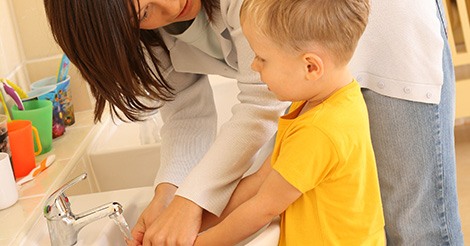 Dish Soap & Pepper Experiment
Dish Soap & Pepper Experiment
Hand washing has become an even more important aspect of our everyday life lately. We all know how hard it can be to get young kids to clean their hands. It is difficult to explain to them what germs are and how they work. To help with this, you can do a fun little experiment with your children at home. You can simply get a paper plate (or any plate), put some water on it, and then sprinkle some pepper on top of the water. The pepper represents the “germs”. You will also want to have a small dish with some soap in it (or simply a bottle of soap). Have your children dip their finger in the soap first and then dip their finger in the pepper (germ) filled water, noticing that all of the pepper (or germs) quickly move away from their finger. You can discuss how this reflects the importance of washing our hands to get rid of germs. If we use our soap and spread it evenly on our hands, the germs will move away from our hands.
Age-appropriate Adaptations:
- Two-year-olds—Your child may need help getting water onto a plate, but you can encourage them to sprinkle some pepper onto the plate on their own. Give them some dish soap so that they are able to spread it on their finger and then watch the reaction. Encourage dialogue about how the germs run away from their clean finger.
- Three-year-olds—Your child can get water onto the plate and sprinkle some pepper onto the plate as well as put soap onto their finger. When watching the reaction, you can ask them why they think the pepper is moving away from their finger and what the pepper represents. Another activity you can add is having them practice their hand washing after watching the reaction.
- Four-/Five-year-olds—Your child can set up the experiment and come up with a hypothesis about what will happen. Ask them questions like: “What do you think will happen when you put your finger in the water?” “What represents the germs in this experiment?” “How can we make sure germs stay off of our hands in the future?” They can come up with their own observations and you can even make a chart with their observations listed for later reference. After finishing the experiment, practicing hand washing is a great following lesson. You may even help your child come up with a rhyme or song while washing their hands.
Skills Supported: scientific experimentation, fine motor and communication
